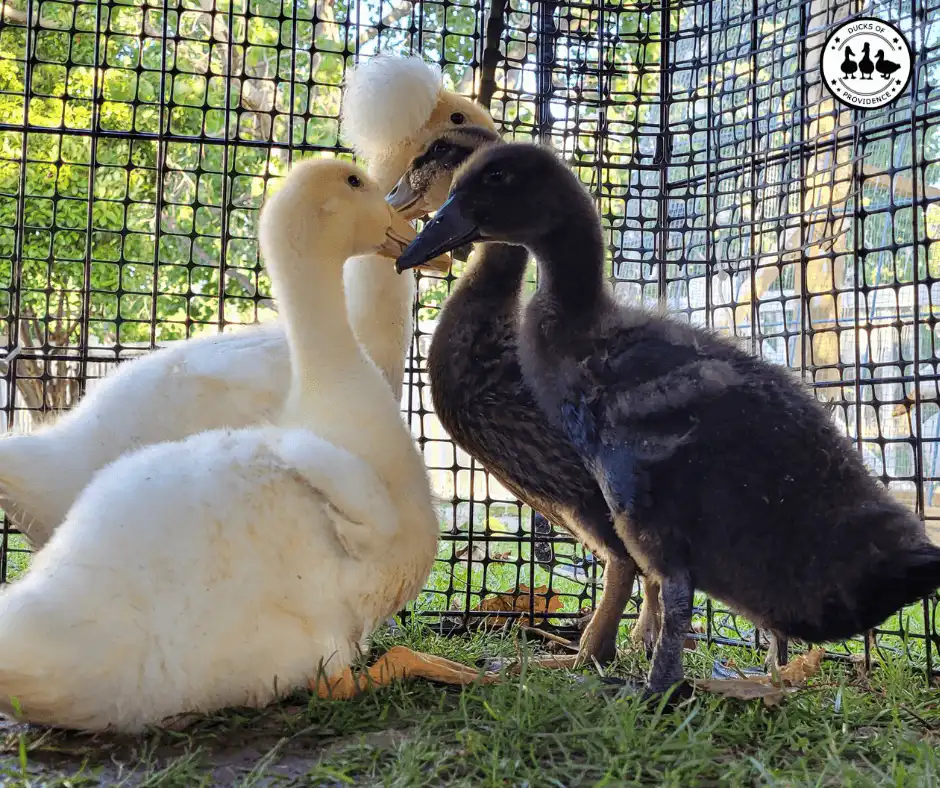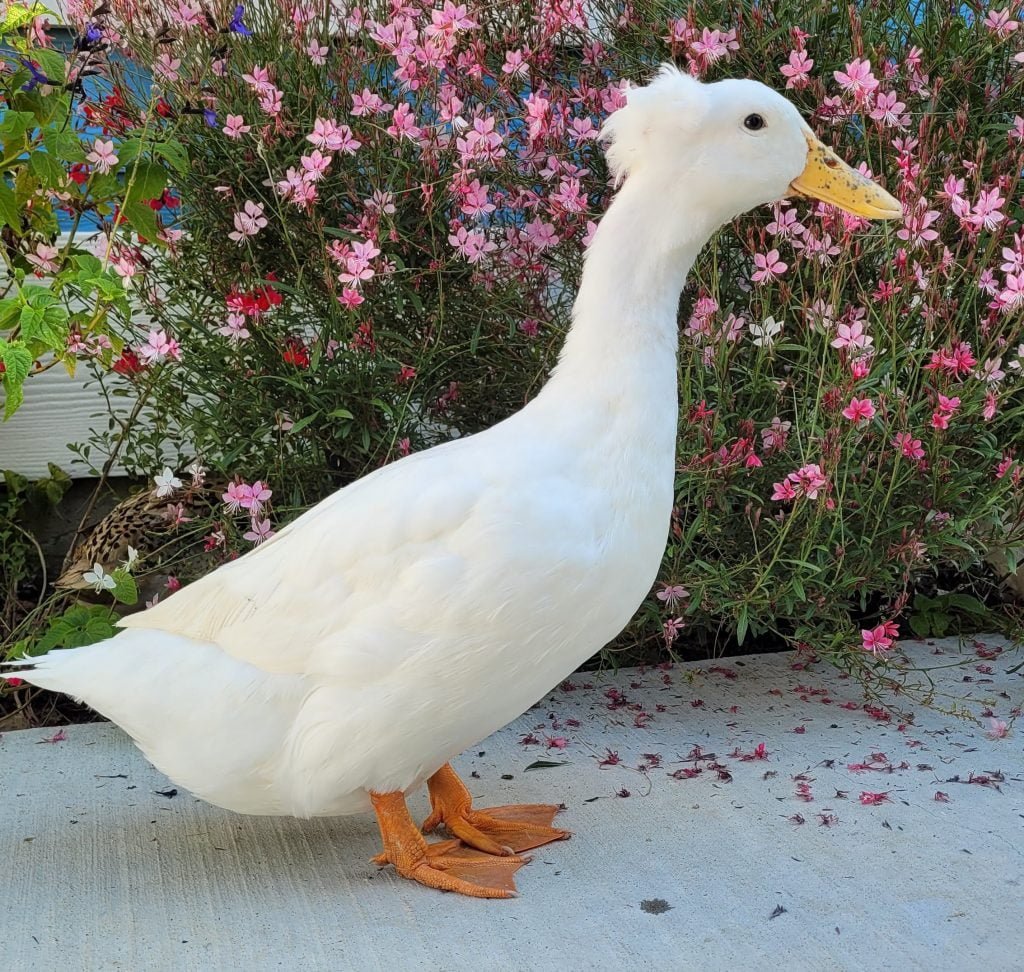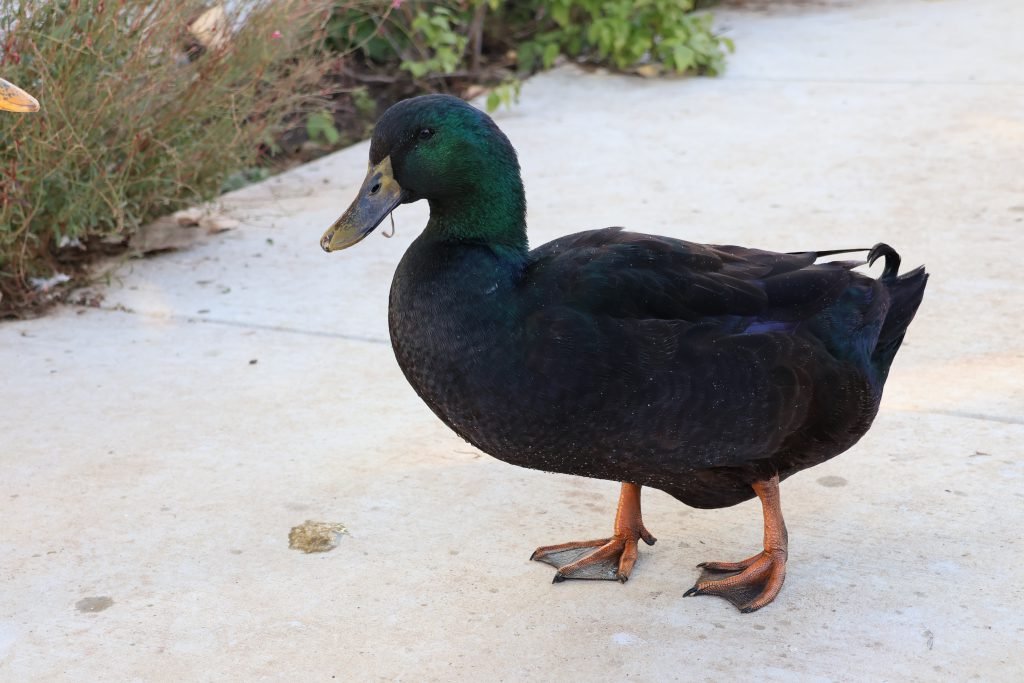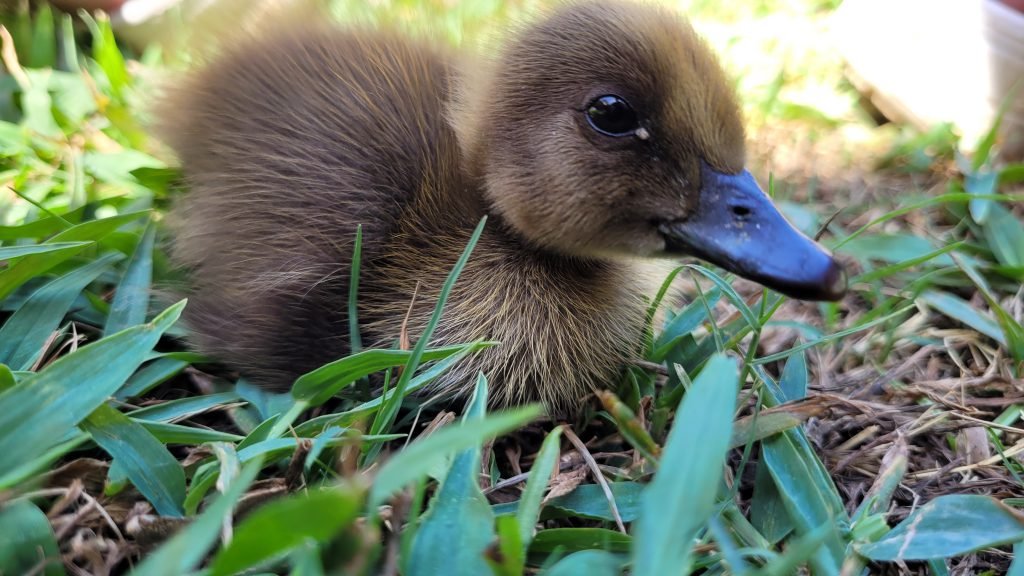
Pet Ducks: How Many should I have? And where do I get them from?
Last updated: January 15th, 2026
If you’ve ever watched ducks waddle around in a pond or heard their joyful quacks, you know how captivating these feathered friends can be. But before you dive into the delightful world of duck-keeping, it’s important to consider the needs and responsibilities that come with caring for these charming, social creatures. One of the first questions you might ask is: How many ducks should I have? Whether you’re dreaming of a small backyard flock or looking to rescue a duck in need, the journey to duck ownership can be both rewarding and fulfilling. In this guide, we’ll walk you through everything you need to know—from how many ducks to bring home to where you can find them. Let’s dive in and discover how to create a safe and happy life for your new feathered companions!
Ducks of Providence is free, thanks to reader support! Ads and affiliate links help us cover costs—if you shop through our links, we may earn a small commission at no extra cost to you. Thanks for helping keep our content free and our ducks happy! 🦆 Learn more
Number of Ducks: How Many Ducks Should I Have?
If you’re considering getting pet ducks, one of the first questions you’ll have is: How many should I get? The short answer is at least two—ducks are highly social animals that thrive in the company of their own kind.
Ducks Need Companionship
Ducks are flock animals, meaning they form strong social bonds with one another. Keeping a single duck is not recommended, as isolation can cause extreme stress, loneliness, and even depression. In some cases, a duck kept alone may stop eating, become lethargic, or develop health issues due to stress. While a human can provide some level of companionship, we can never fully replace the social interactions that ducks naturally have with their own species.

The More, the Merrier!
A larger flock is always better when it comes to ducks. With multiple ducks, you’ll witness fascinating social behaviors, including grooming each other, playing, communicating, and forming friendships. Ducks develop unique group dynamics, and it’s heartwarming to watch them interact, whether it’s a bonded pair waddling side by side or a small group napping together in the sun. If you have enough space and resources, consider getting at least three to four ducks to allow for a more natural flock structure.
What About Single ‘House Ducks’?
You might have seen videos of single pet ducks raised as house companions, often wearing diapers and living indoors. While some ducks adapt to this lifestyle, it is not ideal for them. A lone duck requires constant attention and socialization from its owner. If left alone for long periods, it can become distressed or develop behavioral issues.
There are some situations where keeping a single duck indoors is unavoidable—such as if their companion has passed away or if the duck has a disability that prevents them from living with others. However, in these cases, it’s crucial to provide round-the-clock companionship, enrichment, and as much outdoor time as possible. If you cannot commit to being your duck’s full-time companion, the best solution is to get them a feathered friend.
You may see on social media that some ducks are kept alone as ‘house ducks’; this is, however, not the ideal scenario for a duck. There might be situations where this is the only option, for example, when their partner passes away or the duck is disabled. But remember that this means you need to care for your duck 24/7. So unless you have the time to have them around you all the time, you should get them a duck friend.
➡️ Learn more: Can You Keep Ducks Indoors as a House Pet?
Gender of Ducks: Should You Get All Females, All Males, or a Mix?
One of the most critical decisions when getting pet ducks is choosing the right gender ratio. Should you get all girls, all boys, or a mix? The answer depends on your flock size and goals. Each setup has its own advantages and challenges, so it’s essential to choose what works best for your situation.
Mixed-Gender Duck Flocks
If you want both males and females in your flock, it’s important to manage the ratio carefully. Drakes (male ducks) are very sexually active and can easily overwhelm hens (female ducks) if there aren’t enough of them to distribute the mating behavior. The general recommendation is one drake for every three to five hens to prevent over-mating, which can cause stress, injuries, and even death in extreme cases.
A 5:1 or 6:1 hen-to-drake ratio is even better, especially during mating season when drakes become more persistent. If you have too many drakes and not enough females, the males may start fighting over mates, causing injuries.
We personally have a flock of six hens and one drake, and this setup works very well for us. The hens provide plenty of companionship for the drake while also reducing the chances of aggression and excessive mating pressure.
All-Female Duck Flocks (Hens Only)
A flock with only female ducks has several benefits:
- Better social harmony – Hens generally get along well without the competition that drakes bring.
- Fresh eggs – If you’re interested in collecting duck eggs, an all-female flock ensures a steady supply.
- Fewer aggression issues – Without drakes, there’s no risk of over-mating or territorial fights.
However, hens do come with one big drawback: they are loud! Female ducks are the only ones that produce the classic “quack” sound, and they love to chat throughout the day. If you live in a suburban or urban area, keep this in mind, as their noise level may bother your neighbors.

One of our ducks, Schnatterinchen, a white-crested duck, is a prime example of this. She’s a wonderful member of our flock but is definitely one of the loudest when she has something to say!
All-Male Duck Flocks (Drakes Only)
If you want a quieter flock without worrying about egg production, a flock of only drakes might be an option.
- They are much quieter than hens – Instead of loud quacks, drakes make a soft, raspy sound that is far less disruptive.
- No eggs to manage – If you’re not interested in collecting eggs, you won’t have to worry about nests or broody behavior.
However, all-male flocks come with their own challenges:
- Potential aggression – While they don’t have females to fight over, drakes can still become territorial and aggressive, especially during mating season. Even in all-male groups, you may need to separate individuals if fights break out.
- No eggs – If fresh duck eggs are important to you, this setup won’t provide them.

Which Setup is Right for You?
- If you want fresh eggs and don’t mind the noise, go for an all-female flock.
- If you want a quieter group and can manage occasional fights, an all-male flock could work.
- If you want a natural balance of behaviors, a mixed flock with the right drake-to-hen ratio is best.
Whatever setup you choose, ensuring the right balance of genders will lead to a happier, healthier flock with fewer behavioral issues.
➡️ Read more about the differences between male and female ducks.
Where do I get my Ducks from?
Finding the right ducks for your flock is an exciting journey! There are several options, each with its pros and cons. Here’s a breakdown of where to get your ducks, from farm stores to rescue organizations.
Local Farm Store (not the best option)
Many farm stores sell ducklings during spring, which can be tempting for new duck owners. However, this option may not always be the best for several reasons.
- Unsexed Ducklings (Straight Run) – Farm stores often sell unsexed ducklings, which means you won’t know the gender of your ducks until they are about five to eight weeks old. This can create problems if you’re trying to keep a small, balanced flock and ensure the correct hen-to-drake ratio. If you end up with too many drakes, it can lead to aggression and over-mating.
- Ethical Considerations – While it may seem like a simple solution, purchasing ducklings from farm stores can contribute to the problem of duck dumping. Many people mistakenly release their domestic ducks into local ponds, believing they’ll thrive in the wild. Unfortunately, domestic ducks don’t have the survival skills of their wild counterparts. They cannot find their own food and are easy targets for predators. Additionally, releasing ducks is illegal in many places and can lead to further harm.
In short, while farm stores are convenient, they are often not the best source for ducks if you’re looking for a well-balanced, ethical solution.
Hatchery (Better Option)
If you’re looking for specific breeds or genders, hatcheries like Metzer Farms (where we got our first ducks from) are a great choice. These suppliers offer several advantages over farm stores:
- Breed and Gender Selection – With hatcheries, you can choose the breed and gender of your ducks, which is particularly useful if you’re trying to create a balanced flock with the right hen-to-drake ratio.
- Day-Old Ducklings – Ducklings from hatcheries typically arrive as day-olds, meaning they’re fresh and ready to start their life with you. This is a great option for those wanting to raise their ducks from the beginning.
- Imprinting – Ducklings raised from a young age tend to imprint on their caregivers, seeing them as their parents and forming strong bonds. This makes them easier to handle and more social compared to older ducks. They trust you and are less likely to be fearful or skittish around humans.
Hatcheries are a reliable and ethical way to source your ducks, ensuring you get exactly what you’re looking for while supporting responsible breeding practices.

Duckling (Hatching Your Own)
If you’re up for a bit more adventure and want to experience the joy of raising ducklings from fertilized eggs, this can be a very rewarding option. However, there are a few things to consider:
- Exciting Experience – Hatching your own ducklings can be an incredibly exciting and hands-on experience. Watching the eggs hatch and caring for the babies as they grow is a memorable journey that many duck owners find fulfilling.
- Low Survival Rate – Unfortunately, the survival rate for ducklings hatched at home can be low. You may face challenges with temperature control, humidity, and the health of the eggs. It can take some skill and practice to ensure the eggs hatch successfully.
- Gender Uncertainty – Just like farm store ducklings, you have no control over the gender of the ducklings you hatch. If you’re trying to get a balanced flock with a specific ratio of hens to drakes, this can pose a problem.
While hatching your own ducklings is a special experience, it may not be the most practical option if you’re new to duck-keeping and want more control over your flock’s gender and health.
Hatching your own ducklings from fertilized eggs can be an option as well. That is super exciting, but the survival rate may be low, and again, you have no control over their gender.
Rescue/Sanctuary (Best Option for Adoption)
One of the most heartwarming and responsible options for obtaining ducks is through a rescue or sanctuary. Many ducks find themselves in need of a new home due to various reasons, such as unwanted pet situations, neglect, or abandonment. Here are some reasons to consider adopting a duck:
- Saving a Life – By adopting from a rescue or sanctuary, you’re giving a loving home to a duck that needs one. Many rescues house ducks that have been surrendered by previous owners or found as strays, and they’re waiting for a second chance.
- Adult Ducks – Many rescues and sanctuaries have adult ducks available for adoption. Adopting adult ducks means you skip the challenges of raising ducklings and get a bird that’s already grown and, in many cases, has been socialized to humans. You also avoid the uncertainty of duckling gender.
- No Gender Guessing – When you adopt adult ducks, you know their gender, so you can select the right one for your flock without worrying about an unbalanced ratio.
- Support a Good Cause – Rescues and sanctuaries often rely on donations and adoption fees to keep running. By adopting, you’re supporting these organizations that are dedicated to animal welfare.
Adopting from a rescue or sanctuary is not only a great way to give a duck a home but also a wonderful way to get ducks who are in need of love and care. Check your local adoption networks, classifieds, and animal shelters for available ducks!
What’s next?
You may wonder what are the next steps after getting ducks? Make sure that they can live a happy and healthy life of course!
- Read more about what to feed your ducks
- Pet Ducks: The Ultimate Guide to Keeping and Caring for Them
- Male vs Female Ducks Explained: From Bills to Behaviors
- Get more information about coop and run requirements
- Get an idea of how much work ducks actually are
- Quackonomics 101: Exploring Pet Duck Cost
- Duck Keeping 101
